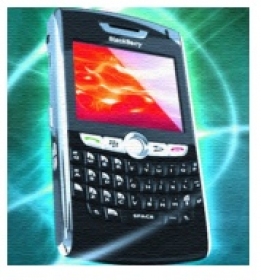BlackBerry Back - DoT clears the way

-
After months of warning BlackBerry licensor Research In Motion (RIM) that it needs to provide a fool-proof security system or be ready to pack up, the Department of Telecommunications (DoT) has taken a complete U-turn. It no longer seems to be worried about BlackBerry services posing a security threat.
Though Minister for Communications and IT, A. Raja, has been insisting on further security clearances from the National Security Advisor, DoT is holding its ground. "There is no threat from BlackBerry services," says Siddharth Behura, telecom secretary. "There is no permission needed for starting value-added services. We have not given permission to anybody, we have not disallowed anybody." DoT is of the opinion that services like BlackBerry should not be denied to users; instead, their encryption systems should be upgraded.
This stand completely contradicts DoT's earlier position that new operators could not launch BlackBerry services till all security issues were resolved.
Operators are, however, happy. DoT's move has cleared the way for companies like Tata Teleservices Limited, BSNL and MTNL which have been waiting for approvals to offer the service. BlackBerry users in the country too are heaving a sigh of relief. India currently has over 115,000 BlackBerry users, distributed among five operators – Bharti Airtel, Reliance Communications, BPL, Vodafone Essar and Idea Cellular.
Meanwhile, several national security agencies are still insisting that the government should compel RIM to put a system in place that will allow them to intercept data sent through handsets. Their claim is based on the fact that email communications between BlackBerry users bypass the networks of Indian mobile operators providing the service. "There should be a single point-of-delivery system for the entire BlackBerry traffic in India, and the traffic originating and terminating in India should not travel outside," the security agencies had stated in their last note to DoT.
BlackBerry services came under DoT's scanner late last year, when the Tatas asked for permission to launch the service. Citing security concerns, DoT conveyed to both RIM executives and the Canadian High Commission that unless the BlackBerry company provided monitoring solutions, either in the form of encryption keys or by shifting the servers to India, the service would be discontinued. Earlier, it had also suggested reducing the 256-bit encryption standard to a 40-bit one, which could then be intercepted by security agencies.
RIM, on its part, was hesitant to compromise on customer privacy. In a recent communication to its customers, RIM stated that it would be "unable to accommodate any request for a copy of a customer's encryption" through which customer data could be intercepted by the security agencies. RIM, which had been fairly tightlipped on the issue, further noted that "governments have a wide range of resources and methodologies to satisfy national security and law enforcement needs, without compromising commercial security requirements".
This naturally led to an extended controversy with RIM facing the heat. The issue got further entangled with the Canadian government getting involved in the talks between the Indian government and RIM.
However, all that is in the past now. Keen to bury the matter, DoT says, "We have never had any issues with RIM. These were raised by the local security authorities. We are the facilitators between the parties (RIM and the security authorities)."
- Most Viewed
- Most Rated
- Most Shared
- Related Articles
- Manufacturing Hub: India emerges as a ke...
- TRAI performance indicator report for Se...
- Prashant Singhal, partner, telecom indus...
- 2G spectrum scam: continuing controversy
- An Eventful Year: Telecom highlights of ...
- Telecom Round Table: TRAI’s spectrum p...
- Manufacturing Hub: TRAI recommends indig...
- Linking Up: ITIL to merge with Ascend
- High Speed VAS - Killer applications w...
- Bharti Airtel seals deal with Zain - Zai...






